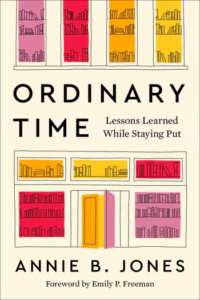
Simple, Not Shallow: In Praise of Seemingly Surface Friendships
Annie B. Jones: “Surface, I have learned, might be okay. It might even be enough. It might be all there is.”
My first book club was a New Year’s resolution I made when I was twenty-three, a resolution for years I bragged I’d actually seen to fruition. I didn’t know how to meet people or make friends after college graduation, but I knew with Jordan in law school, I’d need company. I had made one friend through work—that’s all it takes, just one—so when I set the goal in January to launch a book club, I asked her to join me. We tasked ourselves with inviting a handful of acquaintances from our respective churches and workplaces and neighborhoods, and it was like that baseball movie men love so much; we built it, and people came.
I can’t remember the first book we read (just kidding; I looked it up, and it was, I am sorry to say, The Shack), but I know that first group we brought together never again had the same configuration. Women came and went all the time; I can’t recall some of their names, cannot begin to picture all of their faces. Over our years of meeting, a core group of women eventually emerged, and a few of those became what I’d consider lifelong friends. We’ve stayed in touch across various moves and time zones, and although we still share book recommendations back and forth, our friendships have evolved into so much more. For so long, I thought that was the lasting legacy of my Tallahassee book club: I really did meet and make some of my very best friends through our monthly conversations.
It’s so easy to overcomplicate relationships and the effort they require. Book club simplifies all of it.
But the older I get and the further removed I am from that original book club, the more I wonder if its primary long-term impact was actually a life lesson about hospitality and lowering expectations, the life-altering realization that surface relationships—relationships I once deemed shallow or unimportant—are the stuff of life. Settling for seemingly shallow relationships might be what saves us.
In other words, what if we just let book club be book club?
Even if you’re the academic sort, book clubs should be a relatively low-stakes enterprise. Part of the reason women felt comfortable swimming in and out of the waters of our book club meetings was because as long as you’d read the book—or part of it, or a synopsis online—you could contribute to the conversation. Book clubs provide a low point of entry. You don’t need to be an expert or an extrovert, the most well-spoken or the most intellectual. You can just sit and eat the snacks if you want. (Book clubs should always have snacks.) There’s a point of commonality, and it has nothing to do with where you’re from or what your degree is in or where you went to school or whether you’re married or have children. It’s just: Did you read the book? Why or why not? Did you like the book? Why or why not?
It’s so easy to overcomplicate relationships and the effort they require. Book club simplifies all of it. When I moved to Thomasville, it took me months to let go of my old book group. I loved those women, even as the group had morphed and changed into something new and different. When there were more unfamiliar faces in the room than familiar, I knew it was time to plant my roots in my new community, and after living in Thomasville for about a year, I started a new book club in my new town. I’m not sure if any of the women who were at that first meeting are in the group today; that’s how much a group can shift and change over the years.
I remember, though, that after months of trying to prove myself in this new place, I was relieved to just sit and talk about a common text; I didn’t have to share about where I’d come from or who I’d been. I didn’t really have to talk about The Bookshelf or why we’d moved. I just had to talk about ideas, characters, plotlines. That, I thought, I could do. No vulnerability hangover required.
It’s true: I’ve met my best friends through book club. I think it’s partly just the regularity of it; after meeting month after month for years, it’s possible to eventually form bonds beyond the literary. In Tallahassee, those women came together for baby and bridal showers, goodbye dinners and support groups. Book club, I once told Jordan, felt like what I imagined church could be, a group of very different people from very different backgrounds and with very different interests and worldviews gathering in people’s homes, swapping silly stories, and sharing in engagements and broken dates and favorite movies and promotions and pets.
But it’s also just way lower stakes than that. Again, there were women in my book club whose names I can’t remember. I couldn’t name for you without looking at a spreadsheet (naturally, there is a spreadsheet) of all the books we read.
Some months in book club, yes, we learn about a friend’s breakup or we rejoice in the news of a new baby or a new marriage or a new job, but most of the time it’s sitting and talking about a book, and that’s it. I leave, and I don’t feel deep or sentimental about it. It’s just something I do, and that’s the point.
I am, perhaps you’ve noticed, a “best friend” kind of girl. I love staying and nestling deep into relationships, long-term. I have always felt most made for in-depth, years-long friendship; I mate for life, and I pride myself on it.
But monthly book club meetings have made me a better acquaintance. I’m better at small talk now, and even though I still get very sweaty at cocktail parties, if I’m seated next to you at some random dinner function or another, I’m probably better company than most. I didn’t used to be. I really think book club taught me how.
Life isn’t always decades-long friendships or midnight heart-to- hearts. A lot of life is just showing up, offering a smile or a quick wave, maybe just checking in for a minute or two. A lot of life is shallow.
I once found myself in conversation—at book club, I think—with a woman I barely knew. I had just moved to Thomasville and was asking how she suggested meeting people. “I do weekly Bunco games in my neighborhood,” she told me. “It’s not like those women are necessarily going to become my best friends. But now I can wave and ask about their kids. It’s nice.”
This is where I’ve always struggled. Maybe it’s my personality or my calendar or how I set boundaries or what I’m willing to do with my time. But this aspect of friendship and community is where I have always had the most difficulty. I am not good with surface-level relationships.
It was so much more enjoyable to finally allow book club to be what it actually is: a fun monthly gathering of a group of people who talk about books.
In Better Than Before, author and podcaster Gretchen Rubin asks if we’re openers or finishers; are we better at starting new things or wrapping things up? Jordan immediately identified me as a finisher, and it’s true. I am great at finishing things. I meet deadlines; I conquer my goals. Give me a task, and I will see it through. I am a finisher.
But life requires a lot of opening. And I am not so good with the opening, the starting of something new.
Rubin may not have meant for her questions to apply to relationships, but I think the principle of opening versus closing is apt when we’re talking about friendships in adulthood.
I have several friends who are great at meeting new people. They are comfortable inviting strangers into their homes; they are confident in conversation and adept at networking and small talk. They set people at ease and know how to be hospitable in their hearts and in their homes.
Those are things I become excellent at, with time. I have the potential to be a great friend. But I am not always a good acquaintance.
When I started my Thomasville book club, I told myself I wouldn’t have high expectations, but I secretly hoped I’d meet a couple of kindred spirits, bosom friends, lifelong companions. The community I’d dreamed of would start building itself.
That is a lot of pressure to put on any one person or group, and I think my early years in Thomasville suffered from that pressure. I kept expecting my book club and some random women’s group I’d joined to leave me with my new ride-or-dies, and I was constantly disappointed. It was so much more enjoyable to finally allow book club to be what it actually is: a fun monthly gathering of a group of people who talk about books. Period.
The woman who plays Bunco? She told me she had difficulty forming close friendships, but unlike me, she never seemed to mind. She’s got Bunco. Book club. Maybe a small group through her church. Those relationships tend to be surface level by her admission, but they have the potential to grow into something more. And if they don’t? They still count. She knows their names, their stories, can wave and visit and interact comfortably.
Surface, I have learned, might be okay. It might even be enough. It might be all there is.
__________________________________

Excerpted from Ordinary Time: Lessons Learned While Staying Put by Annie B. Jones. Reprinted with the permission of the publisher HarperOne, an imprint of HarperCollins. Copyright © 2025 by Annie B. Jones.
Annie B. Jones
Annie B. Jones is a writer, podcaster, and the owner of The Bookshelf, an independent bookstore in Thomasville, Georgia. Jones hosts From the Front Porch, a weekly podcast about books, small business, and life in the South, and her work has been featured in Southern Living magazine. A native of Tallahassee, Florida, she lives in Thomasville with her husband, Jordan, and their dog, Sam Malone.



















